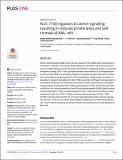NUC-7738 regulates β-catenin signalling resulting in reduced proliferation and self-renewal of AML cells
Abstract
Acute myeloid leukemia (AML) stem cells are required for the initiation and maintenance of the disease. Activation of the Wnt/β-catenin pathway is required for the survival and development of AML leukaemia stem cells (LSCs) and therefore, targeting β-catenin is a potential therapeutic strategy. NUC-7738, a phosphoramidate transformation of 3’-deoxyadenosine (3’-dA) monophosphate, is specifically designed to generate the active anti-cancer metabolite 3’-deoxyadenosine triphosphate (3’-dATP) intracellularly, bypassing key limitations of breakdown, transport, and activation. NUC-7738 is currently in a Phase I/II clinical study for the treatment of patients with advanced solid tumors. Protein expression and immunophenotypic profiling revealed that NUC-7738 caused apoptosis in AML cell lines through reducing PI3K-p110α, phosphorylated Akt (Ser473) and phosphorylated GSK3β (Ser9) resulting in reduced β-catenin, c-Myc and CD44 expression. NUC-7738 reduced β-catenin nuclear expression in AML cells. NUC-7738 also decreased the percentage of CD34+ CD38- CD123+ (LSC-like cells) from 81% to 47% and reduced the total number and size of leukemic colonies. These results indicate that therapeutic targeting of the PI3K/Akt/GSK3β axis can inhibit β-catenin signalling, resulting in reduced clonogenicity and eventual apoptosis of AML cells.
Citation
Shahid , M A , Um , I H , Elshani , M , Zhang , Y & Harrison , D J 2022 , ' NUC-7738 regulates β-catenin signalling resulting in reduced proliferation and self-renewal of AML cells ' , PLoS ONE , vol. 17 , no. 12 , e0278209 . https://doi.org/10.1371/journal.pone.0278209
Publication
PLoS ONE
Status
Peer reviewed
ISSN
1932-6203Type
Journal article
Description
Funding: This study was supported by research funding from NuCana plc to all authors.Collections
Items in the St Andrews Research Repository are protected by copyright, with all rights reserved, unless otherwise indicated.

